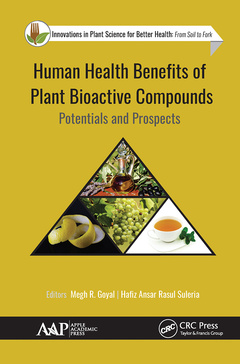Description
Human Health Benefits of Plant Bioactive Compounds
Potentials and Prospects
Innovations in Plant Science for Better Health Series
Coordinators: Goyal Megh R., Rasul Suleria Hafiz Ansar
Language: English
Subjects for Human Health Benefits of Plant Bioactive Compounds:
Keywords
Flaxseed Gum; Steviol Glycoside; modern drugs; Orange Peel Powder; plant bioactive compounds; SDG; functional foods; Tea Polyphenols; human health; modulate biological systems; Cancer Insurgence; Black Tea; Dietary Fiber; Phenolic Acids; Black Tea Extract; Black Tea Polyphenols; Wheatgrass Juice; Black Carrots; Green Tea Catechins; Citrus Peel; Moringa Plant; Fenugreek Seeds; Green Tea; Moringa Leaves; Flaxseed Oil; Omega-3 Fatty Acids; Grape Seed; Peel Extract; Ldl Oxidation
Publication date: 03-2021
Support: Print on demand
Publication date: 08-2019
· 15.6x23.4 cm · Hardback
Description
/li>Contents
/li>Biography
/li>
Focusing on the importance of functional foods and their secondary metabolites for human health, this volume presents new insights with scientific evidence on the use of functional foods in the treatment of certain diseases. The plants covered and their bioactive compounds are easily accessible and are believed to be effective with fewer side effects in comparison with modern drugs in the treatment of different diseases. The plants contain chemical compounds that can modify and modulate biological systems, eliciting therapeutic effects. Some plants and derived products mentioned include black carrot, olive oil, citrus peel, grapes, candy leaf, cereals and grains, and green and black tea.
The volume is divided into four sections that cover these topics:
- Functional foods for human health: the available sources, biochemistry, structural composition, and different biological activities, especially antioxidant activity.
- Pharmacological aspects of fruits and vegetables: the extraction of bioactive molecules, phytochemistry, and biological activities of a selection of plants.
- Pharmacological aspects of natural products: bioactive compounds, structural attributes, bioactivity of anthocyanin, piceatannol, and a review of the ethnobotany and medicinal properties of green and black tea.
- Pharmacological aspects of cereals and grains: the health benefits of flaxseed, wheatgrass juice, and use and therapeutic potential as supplements for disease management.
Part 1: Functional Foods for Human Health 1. Functional Foods: Concepts and Their Health Perspectives 2. Plant-Based Functional Foods for Human Nutrition: Current Trends, Future Perspectives, and Phytochemical Attributes 3. Natural or Synthetic Antioxidants in Foods Part 2: Pharmacological Aspects of Fruits and Vegetables 4. Heath Benefits of Anthocyanins in Black Carrot (Daucus carota) 5. Olive Oil Phenols: Chemistry, Synthesis, Metabolism, Fats, and their Allied Health Claims 6. Phytochemicals from Citrus Peel: Perspectives and Allied Health Claims 7. Phytochemistry of Grapes (Vitis vinifera L.): Functional and Nutraceutical Attributes Part 3: Pharmacological Aspects of Natural Products 8. Piceatannol: A Review of Natural Sources, Extraction Methods, and Biological Activities 9. Plant-Based Neurotoxins: Impact on Neural Pathologies 10. Health Benefits of Candy Leaf (Stevia rebaudiana): Physiological and Pharmacological Actions Part 4: Pharmacological Aspects of Cereals, Grains, and Tea 11. Wheatgrass Juice: A Nutritional Weapon against Various Maladies 12. Flaxseed: Shield against Life-Style-Related Maladies 13. Green Tea for Human Health Benefits: Phytonutrients and their Therapeutic Potential 14. Black Tea Polyphenols: Health-Endorsing Perspectives, a Mechanistic Appraisal
Megh R. Goyal, PhD, PE, is a Retired Professor in Agricultural and Biomedical Engineering from the General Engineering Department in the College of Engineering at the University of Puerto Rico–Mayaguez Campus. He was the first agricultural engineer to receive the professional license in Agricultural Engineering from the College of Engineers and Surveyors of Puerto Rico. He was also proclaimed as "Father of Irrigation Engineering in Puerto Rico for the twentieth century" by the ASABE, Puerto Rico Section, for his pioneering work. A prolific author and editor, he has written more than 200 journal articles and several textbooks and has edited over 60 books.
Hafiz Ansar Rasul Suleria, PhD, is the Alfred Deakin Research Fellow at Deakin University, Geelong, Victoria, Australia. Recently, he completed a postdoctoral fellowship at the Department of Food, Nutrition, Dietetic and Health at Kansas State University, Manhattan, Kansas, USA. He is an Honorary Fellow in the Diamantina Institute, Faculty of Medicine, The University of Queensland, Australia. The recipient of several awards and scholarships, Dr. Suleria has published more than 60 peer-reviewed scientific papers.




